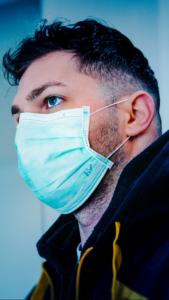How do we protect ourselves from viruses?
Virus. The word has dominated the media in light of the Covid-10 pandemic. But what are viruses exactly? And how do we protect ourselves against these pathogens too small to see with the naked eye? It’s time we dive into the science of how these microorganisms can spread.
On the micro-level, viruses are DNA or RNA, and they are even smaller than bacteria, so how do we fight this war against pathogens we can’t even see?
On a superficial level, we can protect ourselves against viruses by staying away from people who may be showing symptoms of being sick or infected, regularly washing our hands for at least 20 seconds, and avoid touching our face, nose, or mouth.
Transmission happens through cough droplets, sneezes, and bodily fluids exchange, including sexual contact & shared needles. People can spread viruses like influenza and coronavirus by touching contaminated doorknobs, electronic devices, and other frequently touched surfaces, including skin contact (handshakes). The most contagious viruses are airborne like measles, but some hazardous viruses like HIV or AIDS require direct contact either by sexual intercourse or shared bodily fluids and blood.
Once the microorganism gets inside the human body, the virus’s genetic material allows it to damage and change our cells to multiply rapidly. Our immune systems come into play when we can’t fight it off. The viral infection can become a deadly illness.
Although viruses tend to last longer on hard surfaces like plastics or steel, they still will be spread on soft fabrics like clothing or pillows. It may be hard to believe, but animals can also transmit viruses to humans, which is why it’s crucial to prepare our foods in a clean, disinfected kitchen.
A nutritious diet, exercise, and sleep can help you maintain a healthy body and immune system, which will give you a fighting chance against viruses. It’s also essential to disinfect surfaces in your home regularly.
Win the war against pathogens-
• Wash your hands routinely with soap and water for at least 20 seconds.
• Wear a mask if you are going into busy public establishments.
• Disinfectant your home regularly and especially frequently touched items like cell phones; Bacoban is suitable for use on hard surfaces, including electronics and touch pads.
• Throw out tissues immediately after use.
• Wash your hands after coughing, sneezing, or blowing your nose.
• Do not share needles under any circumstances.
• Avoid touching your face.
• Use protection during sexual intercourse.
• Disclose your virus status to others so they can make informed decisions.


